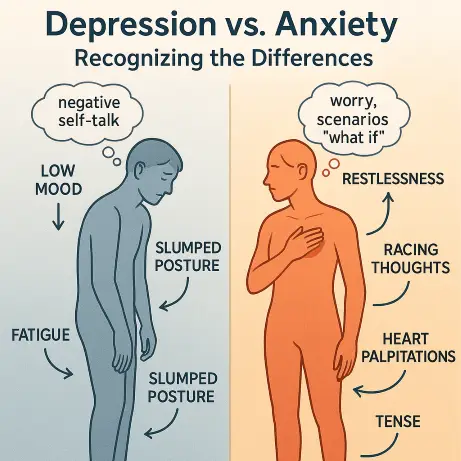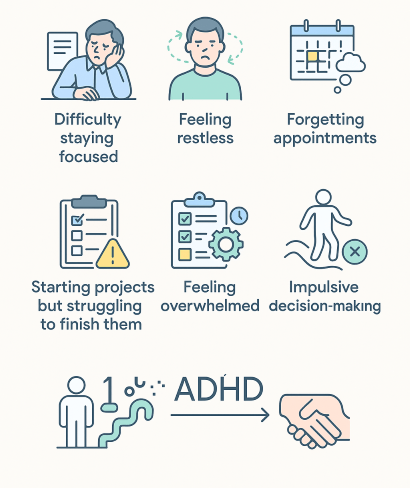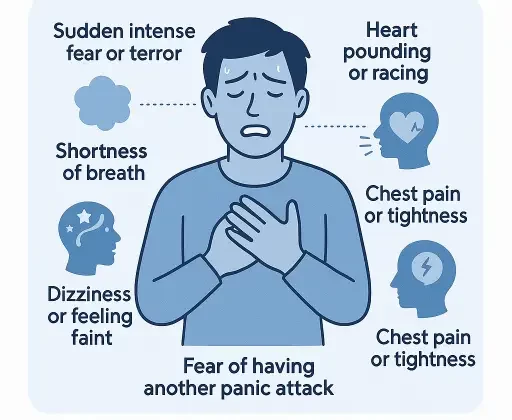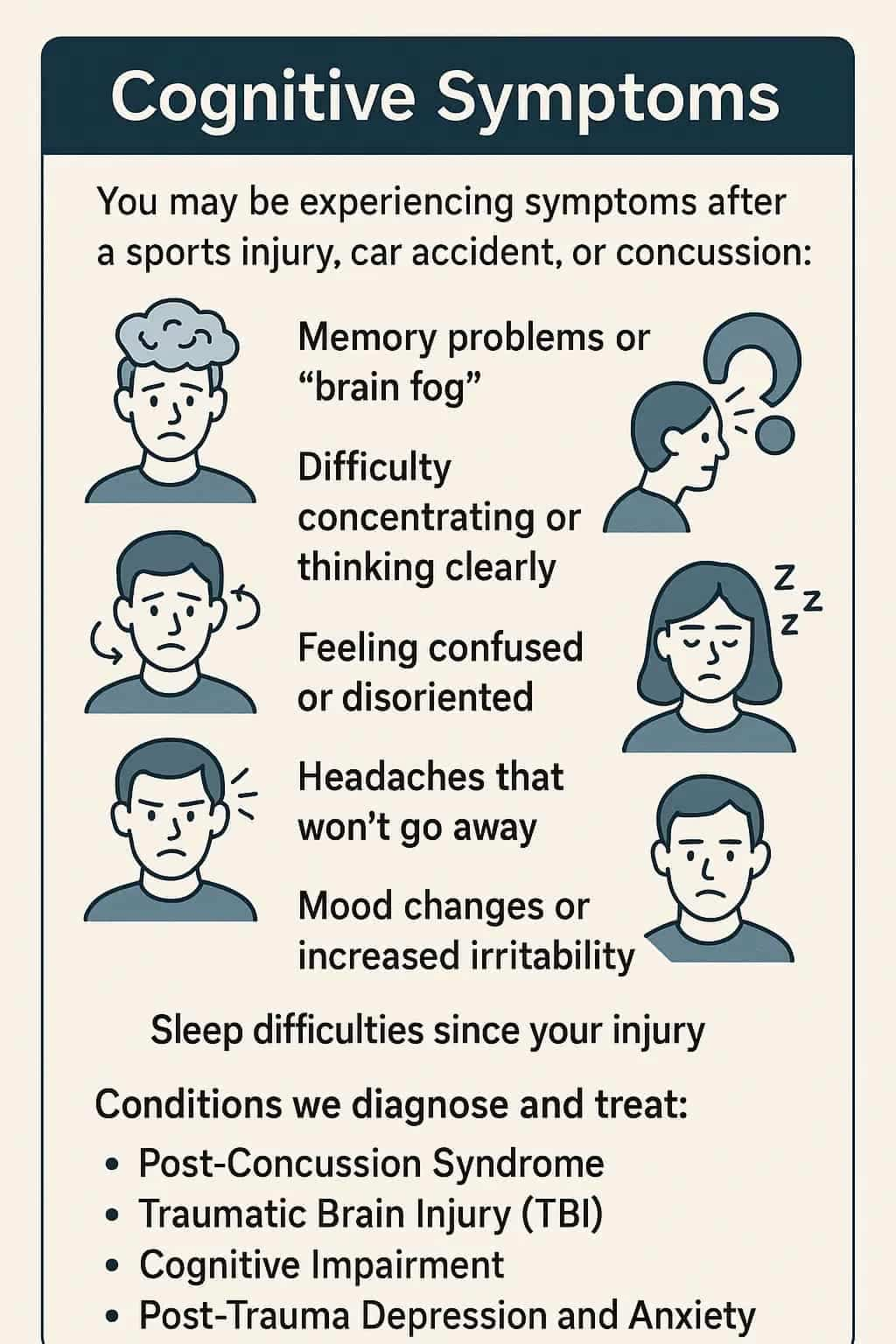Expert Psychiatric Care & Psychological Services online or in our Midtown Manhattan Office.
Whether you’re managing depression, anxiety, ADHD, postpartum mood disorders, or navigating perimenopause, you don’t have to face it alone. Our multidisciplinary team offers comprehensive care, from diagnostic evaluations and therapy to medication management, tailored to what works best for you.

Expert Care for Anxiety, Depression, ADHD, and Cognitive Recovery
Are you struggling with persistent worry, difficulty concentrating, or feeling unlike yourself after an injury? We help adults and older adults in Manhattan reclaim their mental clarity, energy, and confidence through comprehensive psychiatric care that addresses both your symptoms and their underlying causes.
Since 2008, Dr. Iospa Psychiatry Consulting has served as Manhattan’s trusted center for integrated mental health care. Under Dr. Alla Iospa’s leadership, our collaborative team specializes in treating anxiety, depression, and ADHD. We also help patients with panic attacks and cognitive issues following sports injuries or car accidents
Our Approach to Mental Health
At Dr. Iospa Psychiatry in Midtown Manhattan, we believe mental health care should be as individual as you are. Every patient’s experience, stressors, and goals are unique — so your treatment should be, too.
We begin by listening. Before discussing medications or diagnoses, we take time to understand your life, values, and priorities. From there, we design personalized, evidence-based treatment plans built around your needs and lifestyle.
Each patient receives a comprehensive individualized assessment that goes beyond symptoms to include medical history, habits, and environment. Using proven methods and clinical expertise, we craft customized care plans combining therapy and medication management, grounded in science, compassion, and practicality.
Many NYU Langone specialists including cardiologists, neurologists, and primary care physicians — refer their patients to us for trusted psychiatric support. This collaboration reflects our reputation for excellence and ethical, evidence-based care.
Your personalized treatment plan evolves as you do. Whether you’re addressing anxiety, depression, ADHD, or stress from high-pressure environments, our goal is lasting clarity, balance, and well-being.
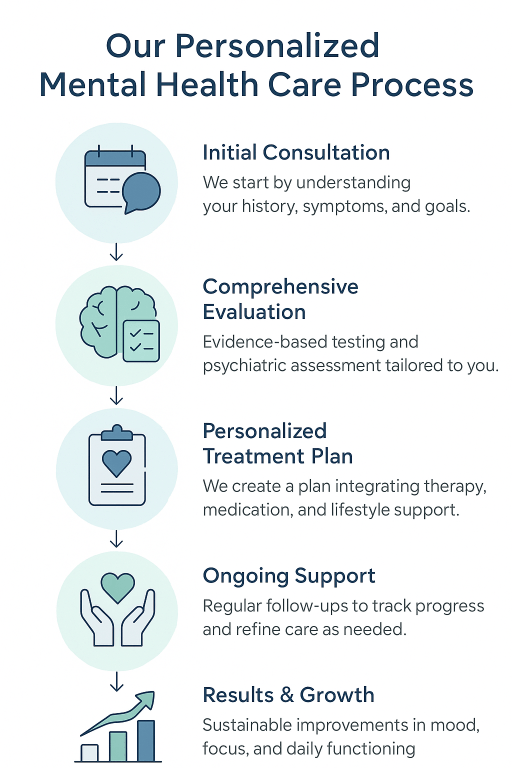
Our Services
At Dr. Iospa Psychiatry Consulting in Midtown Manhattan, we provide comprehensive and personalized psychiatric, psychological, and neuropsychological care. Our services combine advanced treatment with in-depth evaluation, helping individuals, college students, professionals, and families achieve clarity, stability, and growth. From medication management to neuropsychological testing and psychotherapy, we offer the full spectrum of mental health services in New York City.

Medication Management in Psychiatry (Psychopharmacology)
Medication management is a collaborative process that includes selecting the right treatment, monitoring progress, and making adjustments when needed
Comprehensive Monitoring and Adjustments
Our psychiatrists carefully evaluate how well medications work and address:
-
Side effects and tolerability: minimizing adverse symptoms.
-
Combination therapy – ensuring safe use of multiple medicines when necessary.
-
Symptom evaluation – distinguishing side effects from underlying conditions.
This approach is essential for Patients sensitive to medication who may require lower doses or gradual adjustments. and Individuals with coexisting medical conditions (such as thyroid disease, cardiovascular issues, or neurological conditions), where careful coordination is essential.
Psychotherapy
We offer evidence-based psychotherapy tailored to each individual’s needs. Our clinicians provide:
Cognitive Behavioral Therapy (CBT) for anxiety, depression, and maladaptive thought patterns.
Dialectical Behavior Therapy (DBT) for emotional regulation, interpersonal effectiveness, and resilience.
Supportive and Insight-Oriented Therapy to process challenges, build coping strategies, and foster personal growth.
Our therapeutic approach emphasizes collaboration, safety, and lasting change—whether addressing mood, stress, or lingering brain fog that interferes with daily life.
Neuropsychological and Psychoeducational Testing
We provide comprehensive evaluations to better understand attention, memory, executive functioning, and learning. These assessments help clarify conditions such as ADHD, learning disorders, brain injuries, and age-related changes. Results can guide treatment, accommodations, and strategies for school, work, or daily life.
Cognitive Remediation Therapy (CRT)
CRT uses structured, evidence-based exercises to improve mental performance in areas like focus, organization, and problem-solving. Many patients notice reduced “brain fog” and greater clarity in academic, professional, and creative environments.
When to Seek Help: Symptoms We Treat
Anxiety and Worry Symptoms
You may be experiencing:
- Constant worry that interferes with daily life
- Racing thoughts you can’t control
- Physical symptoms like rapid heartbeat or sweating
- Avoiding situations due to fear or anxiety
- Difficulty sleeping due to anxious thoughts
Conditions we diagnose and treat:
- Generalized Anxiety Disorder (GAD)
- Social Anxiety
- Health Anxiety
- Panic Attacks
- Panic Disorder
Depression and Mood Symptoms
You may be experiencing:
- Persistent sadness or feeling empty
- Loss of interest in activities you once enjoyed
- Fatigue or low energy most days
- Difficulty making decisions or concentrating
- Changes in appetite or sleep patterns
- Feeling hopeless or worthless
Conditions we diagnose and treat:
- Major Depressive Disorder
- Bipolar Disorder
- Seasonal Depression
- Postpartum Depression
ADHD and Focus Symptoms
You may be experiencing:
- Difficulty staying focused on tasks at work or home
- Feeling restless or unable to sit still
- Forgetting appointments or important tasks
- Starting projects but struggling to finish them
- Feeling overwhelmed by daily responsibilities
- Impulsive decision-making
Conditions we diagnose and treat:
- Adult ADHD
- Executive Function Disorders
- Attention Deficit Hyperactivity Disorder
Panic Attack Symptoms
You may be experiencing:
- Sudden intense fear or terror
- Heart pounding or racing
- Shortness of breath or feeling like you can’t breathe
- Chest pain or tightness
- Dizziness or feeling faint
- Fear of having another panic attack
Conditions we diagnose and treat:
- Panic Attacks
- Panic Disorder
- Agoraphobia
- Specific Phobias
Post-Injury Cognitive Symptoms
You may be experiencing symptoms after a sports injury, car accident, or concussion:
- Memory problems or “brain fog”
- Difficulty concentrating or thinking clearly
- Feeling confused or disoriented
- Headaches that won’t go away
- Mood changes or increased irritability
- Sleep difficulties since your injury
Conditions we diagnose and treat:
- Post-Concussion Syndrome
- Traumatic Brain Injury (TBI)
- Cognitive Impairment
- Post-Trauma Depression and Anxiety
Other Symptoms We Address
- Relationship stress: High-conflict situations, marital problems, social isolation
- Life transitions: Career changes, retirement, empty nest syndrome.
- Sleep issues: Insomnia, nightmares, sleep anxiety, sleep hygiene
- Stress management: Chronic stress leading to irritability, tension headaches, and difficulty relaxing
- Burnout: Emotional exhaustion, lack of motivation, and feeling overwhelmed by responsibilities
- Menopausal symptoms: Mood swings, anxiety, or depression during hormonal changes
- Long COVID effects: Brain fog, concentration problems, mood changes
Meet Our Manhattan Psychiatry and Psychology Doctors.
Our multidisciplinary team includes board-certified psychiatrists, licensed clinical psychologists, and neuropsychologists who specialize in treating anxiety, depression, ADHD, and post-injury cognitive symptoms.
Our Comprehensive Treatment Approach
Psychiatric Evaluation and Medication Management
Our board-certified psychiatrists conduct thorough assessments to understand your overall health and mental state. We carefully prescribe and monitor medications, adjusting based on your response and lifestyle. Regular follow-ups ensure treatments remain effective over time.
Neuropsychological Assessment and Treatment
We offer comprehensive care for cognitive symptoms following injury:
- Full cognitive evaluations to pinpoint areas of difficulty
- Assessments of memory, attention, and executive function
- Cognitive rehabilitation therapy to restore functioning
- Return-to-work or sports readiness evaluations
- Coordination with medical specialists involved in your recovery
Integrated Wellness Support
Mental health is closely linked to physical well-being, lifestyle, and social factors. That’s why our practice also emphasizes:
Sleep health – strategies for insomnia, nightmares, or disrupted sleep cycles
Stress management techniques – addressing burnout, chronic tension, and fatigue
Support during life transitions including career changes, retirement, or family role shifts
Guidance for sensitive populations patients with complex medical conditions or sensitivity to medications benefit from extra monitoring and collaboration with their other healthcare providers
Why Choose Our Manhattan Practice?
Collaborative Team Approach
When you visit us, you’re not seeing just one doctor you have access to our entire team of specialists who communicate and coordinate your care. This collaborative approach leads to faster diagnosis. You receive more comprehensive treatment. The result is better outcomes for your mental health.
Specialization in Your Concerns
- 20+ years treating anxiety and depression in Manhattan
- Extensive experience with ADHD in adults who were never diagnosed as children
- Specialized brain injury protocols for athletes and accident survivors
- Understanding of NYC lifestyle stressors that impact mental health
Flexible Care Options
- In-person appointments at our Midtown Manhattan office
- Telehealth sessions for convenience and privacy
- Evening hours to fit your work schedule
Insurance Information
- We participate fully with Traditional Medicare and handle direct billing.
- We are out-of-network providers for most commercial insurance plans.
- Our office will submit insurance claims directly for:
- Psychiatric evaluations and medication services
- Psychotherapy sessions
- Neuropsychological testing.
Understanding Your Costs
Important: Please contact your insurance provider before your first visit to verify coverage.
- Your out-of-network mental health benefits
- Annual deductible and reimbursement percentages
- Any pre-authorization requirements for neuropsychological testing
Payment: You pay at time of service. Your insurance company sends reimbursements directly to you. Our billing team handles all paperwork and follow-up with your insurance company.
Our Midtown Manhattan Location
Dr. Iospa Psychiatry Consulting
28 W 44th Street, Suite 714
New York, NY 10036
📞 (646) 383‑7575
Getting Here
- Right near Grand Central Terminal—easy access from across NYC, Connecticut, or Westchester
- Served by subway lines 4, 5, 6, 7, S, B, D, F, and M
- Near Times Square—for easy access to Midtown work and social hubs
- Nearby garage parking options available for those with mobility needs
Office hours: Morning, afternoon, evening, and weekend appointments available for flexibility.

